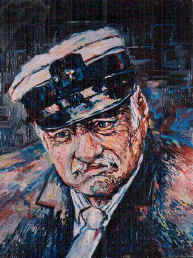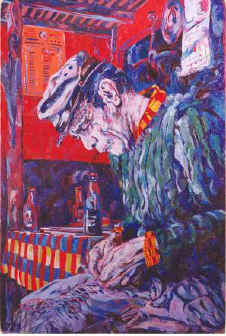

(Story) João Matvichuc
Seated
in an old and rough wood chair, already with the varnish consumed by the time,
the slim boy, with the deep eyes interred by a ghastly thinness, he spied with
undisguised curiosity the old grandfather's serene face, in the serenity of who
rests the sleep of the Death, of an immobile body, framed by imposing coffin,
black as the darkness of the night, all decorated with the most several flowers,
giving an unusual color in the transparent cadaverous rigidity in your shroud.
The
old widow Maria cried quietly, as if the weeping could inconvenience the present
people in the death watch. She looked, of relance, for the grandson and she was
surprised with his fixed glance in the face of the old " diéda " (grandfather's
affectionate diminutive, in Russian).
How to measure the suffering of Vania in the face of the grandfather's
death? It reflected grandmother
Maria, in a mute inquiry. After all, Eugenio was not a truth grandfather
properly, because Vania had been adopted with his son's marriage with Olga, the
boy's genitor, but in spite of the griefs, Vania liked him a lot and he
considered him as true grandfather. It was undisguised his suffering with the
unexpected travel..
Perhaps, babuska " (grandmother's affectionate diminutive, in
Russian) Maria was the only to understand the grandson's dreams. They were
always together and they changed a lot of confidences.
He learned with her to speak to her and to pray in Pole, because as all
Polish that has self-respect, she was very Catholic. She had an onlooker
inherited pastime of the times when she had lived in Russia - she liked to
remove the luck in the cards-playing. Excellent fortune teller woman seemed to
guess the people's future.
In
a certain way, she foresaw that Vania would get married twice and only after the
50 years of age, after the second marriage, he would have a stability in the
life, that would opt for the artistic life and later for the literary career;
finally that he would become a very rich man.
All the forecasts gave right, except for the last. Vania until today, he
dreams in being a rich man.
The grandfather Eugenio had gone it slays of a fulminant heart attack, an
infarct of the myocardium, that removed him for the life with 67 years old. The
most probable cause out the excessive use of the famous cigarettes, mainly in
the last two years, when he got to smoke more than two daily cigarettes case, an
exaggeration, to who intended to arrive to the centennial of the life, following
the genetic traditions of the family. The fatal proof of the crime lied in the
stains among the yellowish fingers for the nicotine. In the moment of the
infarct, grandfather Eugenio still held his last cigarette among the fingers.
How many people will still be decimated by that merciless murderer of the
humanity? When will our government authorities stop being so greedy to
the they allow the cigarettes industry to continue expanding herself more and
more, gaining voluminous profits, what later is translated in having led
percentile in the collection of taxes?
Human life is not worth anything else? Is the vile metal more important
than the life? They are reflections
that appear in our minds, when a dear person dies in consequence of the damned
cigarettes, that curse in addiction form, difficult to expire.
Vânia stayed in silence. The people slowly for the room, as if the noise
of their shoes could inconvenience for the died man. The boy reminded with
clearness the images of a dream, that he had with the old grandfather, in the
previous night. He had dreamed that the old man had appeared at the room, but he
had not gotten to enter, of the door he waived for the grandson a farewell
good-bye.
The boy counted that dream
to his parents and they didn't heard him, thinking it was more one his countless
fantasies. After insistent appeals
so that they went all to the grandfather's house, the parents decided to assist
to the boy's request and all went for there.
And which was not the their surprise, when they found the old extended on
the table of the dining room and the widow crying copiously.Alexandre,
the stepfather frightened before the awful scene, he
didn't get to babble any word, with the feelings suffocating the heart
and the tears dimming the glance. It was visible his suffering before the father's
body.
The calm and serene look of the died, no longer it revealed more the
serious and the expressions of rage, perplexity or of pain, that the so much boy
had known.
His thought flew until a past very distant, in a period in that the boy
traveled the first year of the Primary, in a school of São Paulo,
located in the Vila Zelina. He liked to cut out illustrations of the magazines
and with them to create sceneries for his " plays ". In the absence of
the magazines, he was not done of having implored, he took possession of the
spelling books of the other children's alphabet " and... he cut out them
all. It was a scandal! The
grandfather Eugenio, in the parents' absence, had to attend in the school to
solve the problem, reimbursing the damages and Vânia returned home pulled by
the ear.
Certain occasion, wanting to show his importance for the friends of the
school, when he affirmed that he was the only student possessor of a beautiful
pulse clock, he ended " up lending " the clock of the old and after
exhibiting it for several days and apprehensive of being been hit in the act, he
hid it, in such a way, that not even he got to find. The grandfather Eugênio,
desperate with the disappearance of the estimate clock (it had belonged to his
father), several days he passed seeking and as he didn't find, he finished
suspecting of the grandson.
After an interrogation session, Vania admitted that he had hidden the
clock in the middle of an immense pile of bricks in the bottom of the back yard.
The family passed a whole day seeking in the middle of all those bricks,
until that the boy reminded that had placed it below of his own mattress. New
ear pull and the famous beating with mulberry tree branch, that had left
unforgettable violet marks (sore) in
the back side. Surprisingly, after the grandfather's death Eugenio, Vania, now
adolescent, ended up inheriting that clock. Perhaps, the old man has sorry of
having given such an aching punishment in the grandson.
Eugenio was an old wolf of the sea. Old captain of the Navy Russian Real
czarist (white russians) out a noble one failed, fugitive of the famous Russian
Revolution of 1917, had a lot of luck in that escape, because he was with trip
marked destined for France and to England. Alerted by the friends in earth, that
the revolution was ready to burst, he didn't waste time, he gathered the family
and some nearer friends and they went to the ship in Petrograde, where his
sailors already waited for him, ready to go out to the sea.
They left everything back: properties, pieces of furniture, jewels, money
and everything that the nobility had granted them during a lifetime in Russian
soil. Faking to turn off the past, they left a luxury life back and they decided
to begin other, in new country, without the titles, the luxury and the wealth.
Finally, a simple life as the one of any " mujique " (peasant man), in
the simpleton meaning of the word.
The ship broke taking a group of disinherited sailors and hopeful of
resuming everything again in the old English capital.
France, nice to the czarist cause , and considered a second homeland for
the refugees of the old Russian monarchy (that spoke French with fluency), it
was avoided, for being full of Bolshevik spies. The fugitives wanted to avoid
what was happening with most of the czarist men, they be murdered at the
countries, where they had refugee, as it was the leader's case Trotski, in
Mexico.
Arriving to the port of Liverpool, they abandoned the ship and they left
of train for London. Captain Eugênio and yours commanded
they came undone of the military clothes and they started to live and to
work for they survive, in the humblest conditions. The old captain didn't speak
the English language well and he was forced to work as washer of automobiles in
the streets of London and later in heavy services in the building site.
His situation got better when, through other Russian refugees, he got to
find his old friend, a Russian countess, that later became matriarch of an
important family, that immigrated to Brazil. She provided him, and his sailors,
new documents and financial means to immigrate for our country and the
most important: an employment, although simple, to begin the new life. And it
was as soon as him, his family, and most of his sailors for here they came, in
search
That nucleus migratory came later to compose the Russian population of
several neighborhoods of the Zone East of São Paulo's city, mainly the more
acquaintances, as the Vila Zelina, Vila Lúcia, Vela Bela (where Vania was born)
and Vila Alpina, considered in the decade of 50, about favorite point of the
Slavic people (Russian, Poles, Ukrainian, stonian, Lithuanian, etc).
The old Captain Eugenio, instead of ships, went to command Indústrias
Klabin's main entrance, in São Paulo.
- “Let's go, my grandson, it is the moment of
his grandfather to leave
".
Vania woke up of his memories with the voice of the old babuska "
Maria, placing the hand on his shoulder.
The cover was placed, the pale face disappeared and it was only heard
just the hiccup interrupting the air, and being diluted by the sadness of the
departure. Some men lifted the coffin and they began going in the direction of
the street door. An unexpected thought appeared in the boy's mind:
- " Why they don't bury the " diéda " in the sea "?
-
" Because here in São Paulo doesn't have sea.
What foolishness is
-
“It is " because " Diéda "
Eugenio told me that when one sailor
-
"perhaps..... but.... we go now because it is
later and the cemetery
And the old captain's last trip proceeded to the final side-walk, where
who goes, he doesn't never come back. He is there in eternal rest in the sacred
fields of the Vila Formosa.. To the dear parents that here were it only remained
almost the conformity and the
longing with my homage, of my
" almost grandson ", that here, I leave registered his history.

(Story published in the Select of Verses
and Prose, volume 15, for Publisher Bork - São Luiz Gonzaga - RS - 2001
Pages 152 to 157)
<< Back
|
_________________________________________
_________________________________________ |
site: http://ivanfa.mhx.com.br/